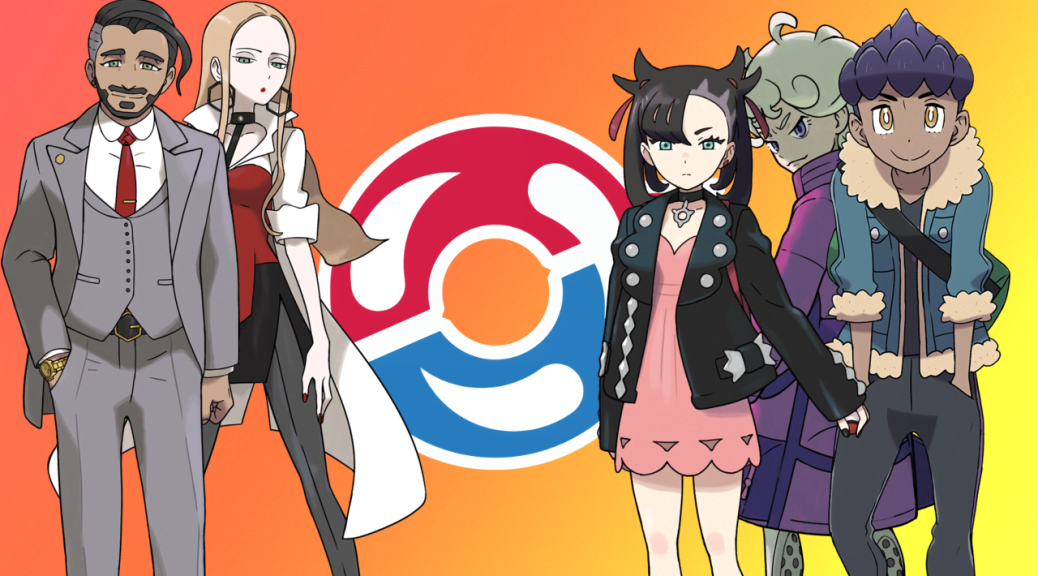SwSh Character Analysis
Pokémon Sword and Shield have been well-received, but their writing has earned them their fair share of criticism. Learn what the games did right in the way they handled their characters and discover the common theme that binds them together.
Pokémon Sword and Shield, although widely very successful, have received a fair amount of criticism for the writing of the games – and much of this critique was well-earned. The handling of Galar’s overarching plot, especially in the latter stages of the games, left much to be desired. However, the focus on what Sword and Shield did poorly has pulled attention away from other aspects of the game and obscured some very well-executed character writing.
This aim of this article is not to defend every aspect of the writing in Sword and Shield, but to draw attention to what makes the characters in the base games some of the best in the franchise.
Hop: Living in Another’s Shadow
Hop is one of three rival characters in the game and, arguably, the “main” one. You encounter him the most through the story, you receive your starter with him and begin your journey with him and he’s there with you when you face Eternatus. He is also the younger brother of Leon, Galar’s undefeated reigning Champion.
Hop shares a lot in common with Hau from the previous generation. Both fill the “happy-go-lucky friend” archetype of rivals that has become increasingly common over the years and both have a successful Trainer as a relative that they aspire to emulate (Hala for Hau and Leon for Hop). However, Hop feels far less hollow of a character than his predecessor.
Why do these two extremely similar characters feel so different then? Well, Hop’s story arc actually explores what living in his brother’s shadow – and arguably also the player’s – has done to him as a person. Hau, on the other hand, never really changes or grows and barely scratches the impact his grandfather has had on him.
Hop idolises his older brother and not only longs for his approval but aims to be just like him, to surpass him even by taking his title as Champion. That is all that really matters to Hop, and you can see it through his dialogue, it’s rare that he ever talks about himself in the context of just being himself. Instead, Hop clearly defines himself as being the younger brother of the undefeated Champion. He simultaneously longs to be recognised in his own right and bases his entire identity on who his brother is.
This is where Hop’s story gets interesting, because Hop is not his brother. The reality is that, whilst skilled in his own right, it becomes quickly apparent that Hop is not as good a trainer as his brother. His inability to measure up to his brother takes a consistent toll on Hop’s confidence, eventually causing something of a breakdown after his off-screen battle with Bede.
The player and Hop encounter Bede together and the two rival characters quickly find themselves in dispute, as Bede actually points out how Hop defines himself beside his brother and calls his personal abilities into question. The two then head off to battle and, although we don’t see the battle itself, we later learn that Hop was beaten badly, which has left him quite depressed.
During the time period after losing to Bede, Hop starts exploring new strategies and team compositions. He resolves to get stronger, so as not to continue dragging Leon’s name through the mud. But this is a period of growth for Hop, as seen when he challenges the player outside of Hammerlocke. After losing to the player, Hop realises that he has to get out of his desperate mindset if he wants to find personal strength. He deepens his resolve to get stronger, but now at his own pace – as his own person. From there on, Hop starts taking his defeats much better. Losing doesn’t demoralise him, it motivates him to continue learning and growing.
Hop grows so much, that by the end of the post game, he no longer defines himself by Leon’s status. Nor does he shift his idolisation onto the player. Instead he finally choses his own path, deciding to apprentice himself to Sonia in pursuit of one day becoming a professor.
Hop’s personal storyline makes for a very compelling and interesting character, with a lot more depth than many other rivals we come across through the Pokémon franchise. He makes for an interesting exploration of feelings of inferiority and idolisation and is much more than just another “best friend” character.
Bede: The Chosen One?
Bede is the second of the rival characters present in Sword and Shield and belongs to a character archetype that many fans have been desperately waiting to see return: the asshole rival. Bede is cocky, rude and unpleasant to be around. He believes himself to be superior to the other Gym challengers as he was endorsed by Chairman Rose himself and he is not at all ashamed to tell you that. Even in defeat, Bede maintains his pompous demeanour and manages to look down on the player.
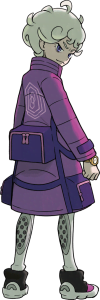 However, Bede is also somewhat of a tragic character. Although the game doesn’t go into many specifics, we learn he had a very lonely childhood, growing up in an orphanage where he struggled to get along with the other children. Rose discovered Bede and took him under his wing, recognising his talent and endorsing him for the Gym challenge. Being recognised by Rose would eventually become the source of not only Bede’s arrogance, but also his hypocrisy.
However, Bede is also somewhat of a tragic character. Although the game doesn’t go into many specifics, we learn he had a very lonely childhood, growing up in an orphanage where he struggled to get along with the other children. Rose discovered Bede and took him under his wing, recognising his talent and endorsing him for the Gym challenge. Being recognised by Rose would eventually become the source of not only Bede’s arrogance, but also his hypocrisy.
“Hypocrisy?” you may ask. The answer to your confusion can be found in the Hop segment above. Before their battle, Bede calls out Hop for defining himself in relation to his brother’s success. But, Bede is doing the exact same thing. Although Rose clearly isn’t that personally invested in Bede, Bede’s entire identity and superiority complex is based around his endorsement by the Chairman. Similarly, he is devoted to the Chairman and lives to impress him. It’s this drive to be acknowledged by Rose that leads to Oleana manipulating him and his hunt for Wishing Stars.
Perhaps though, Bede should be a little thankful to Oleana coaxing him into destroying the ancient mural in Stow-on-Side, because this led to Rose disqualifying Bede from the Gym challenge. This triggered the beginning of his character development, forcing him to re-establish himself and forge a new identity for himself in circumstances far less kind to him (being mentored by Opal). By the time he becomes the new Fairy Gym leader at the end of the game, Bede has grown a lot even if his signature arrogance does remain.
Marnie: The Idol
Although her screen time was unfortunately not as significant as the other rivals, Marnie is an interesting character and quickly became a fan favourite. Marnie is from Spikemuth, a run-down town that is overlooked by the rest of the region for its lack of a power spot and suffers for it. She is also the younger sister of Piers, the town’s Gym leader. Piers wants Marnie to take over his mantle but Marnie has bigger dreams – she wants to become the Champion of Galar and, in doing so, put Spikemuth back on the map.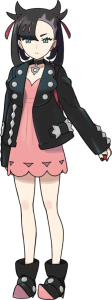
This earns Marnie quite a lot of admiration from the locals, many of whom come together as Team Yell. Unlike most of the game’s “evil teams”, Team Yell does not have bad intentions at all. In fact, they are consistently shown to have very good intentions. They simply want to support Marnie to the best of their abilities and help her achieve her goal. Unfortunately, this leads to them causing problems for everyone else around them as their desire to help Marnie frequently involves trying to obstruct other challengers. Naturally, Marnie finds both her brother’s expectations of her and Team Yell’s antics quite frustrating. She is, after all, noted to be quite stubborn and is very much her own person.
Sadly, Marnie’s defeat at the hands of the player during the Galar League’s finals means she is forced to, at least for the time being, give up on becoming Champion. However, she does retain her goal of helping Spikemuth and takes Piers up on his offer to be his successor, intending to use her position as the new Gym Leader to Spikemuth’s benefit instead.
Although Marnie’s story doesn’t get explored as much as the other rivals’ do and her ending feels less conclusive, it does remain compelling and it is interesting to see her in contrast to Bede and Hop. While the male rivals end up changing their goals by the end of the game, Marnie’s end-game is always earning prestige for Spikemuth, she just changes how she intends to go about doing so.
Oleana: A Dedicated Employee
Oleana is both Chairman Rose’s secretary and the vice president of his company, Macro Cosmos. She is a highly intelligent woman who was previously a researcher involved in the creation of the Dynamax Band. Her role in the story is not very large, certainly not when compared to the rivals or to Rose himself, but it is certainly significant.
As Rose is dedicated to his goals, Oleana is solely dedicated to Rose. She is determined to see him succeed and will stop at nothing to reach that goal, becoming infuriated should anybody stand in his way. She is frequently seen directing the chairman’s activities and keeping him at arm’s length from his fans to ensure he can complete his work. Furthermore, she manipulates Bede through his own dedication to the Chairman, using him to collect Wishing Stars and even having him attack the ruins in Stow-on-Side in pursuit of them. She then allows him to be thrown aside when the chairman revokes his challenger status as a result instead of admitting her responsibility.
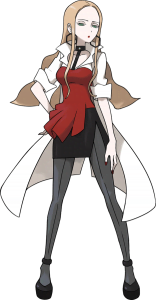 Nearing the game’s climax, she goes to extreme lengths to keep the player, Hop, Marnie and Piers from interfering with Leon and Rose’s meeting. She sends them on a wild goose chase through Wyndon, has Hop and the player fight through and extended series of battles and, in a rage, even battles the player herself in an attempt to stall them or send them away. Through these events it is revealed that she went as far as cultivating her own subset of Macro Cosmos employees to undertake more morally ambiguous tasks – all in the name of helping Rose see the fruits of his ambition.
Nearing the game’s climax, she goes to extreme lengths to keep the player, Hop, Marnie and Piers from interfering with Leon and Rose’s meeting. She sends them on a wild goose chase through Wyndon, has Hop and the player fight through and extended series of battles and, in a rage, even battles the player herself in an attempt to stall them or send them away. Through these events it is revealed that she went as far as cultivating her own subset of Macro Cosmos employees to undertake more morally ambiguous tasks – all in the name of helping Rose see the fruits of his ambition.
What is interesting to note, is that through all this, Oleana never seems repentant. When she asks for the player’s help in stopping Eternatus, it is not because of a change in her morality, it is for the sake of the Chairman. In the post-game, when she is encountered in Galar Mine #1, she is doing voluntary community service not because she is trying to make up for her involvement in triggering the second Darkest Day, but on behalf of Rose. It seems that despite her keen mind, Oleana is unable to grow beyond her single-minded dedication to Rose. Even Oleana’s battle theme is a reflection of her obsession with the Chairman, alluding to his regular music.
Chairman Rose: A Man Possessed
Rose is the main antagonist of Sword and Shield, but it is difficult to label him a villain. He is more in line with characters like Archie, Maxie or Cyrus than Giovanni, Lusamine or Lysandre. Rose is introduced to us as the man that works tirelessly for the sake of Galar, whether that’s in producing its energy or running the Gym challenge and league. Even when his status as the antagonist is revealed, he never breaks this characterisation. Ultimately, Rose’s intentions are good – arguably moreso than the other aforementioned antagonists. He is just severely misguided.
Through his work providing Galar with energy, Rose comes to realise that in the next thousand years, Galar will be left to face an unprecedented energy crisis. He makes it his life’s mission to deal with this problem. His work with Wishing stars presents to him a solution: feeding Eternatus the Wishing stars and unleashing a second Darkest Day. This scenario would create a near infinite amount of energy to fuel the region.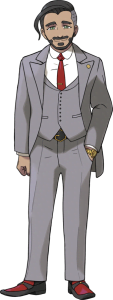
Clearly, this is an extreme step to take in dealing with a problem that won’t rear its head for a millennium. Suffice to say though, in his obsessive efforts to thwart that problem, Rose essentially loses his mind. He develops a messiah complex and is unable to consider the ramifications his actions will have on the present. All that matters to him is saving the future as soon as possible.
Rose’s justifications for his actions are, in honesty, quite flimsy. However, this is kind of the point. Rose is not mentally sound by the time he interrupts the Championship battle to enact his plan. In fact, he has not been particularly stable throughout the entirety of the game. He has fallen beyond the point that normal logic is a part of his thought process. This is clear since he gives up the chance to have Leon on his side and the player none the wiser of his scheme just to unleash Eternatus upon Galar a day earlier. Of course, his hubris and other failings are also immediately apparent once the Darkest Day begins as Eternatus proves too much for either Rose or Leon to control. It is only the combined strength of Zacian, Zamazenta, Hop and the player that Eternatus is able to be defeated and contained. The man who took the weight of the world onto his own shoulders fails in his mission while those who are willing to share the load and support each other and take the time to think succeed in defeating him and minimising the damage he could cause.
The Common Thread
One of the most impressive elements of the writing in Sword and Shield is the thematic thread that ties so many of its characters together – something that may have become apparent as you read through this article. Almost every significant character in the game has a story relating to obsession and the unhealthy effects basing your identity around such an obsession can have.
Hop defines himself entirely as being the Champion’s younger brother. His sense of self worth isn’t based on his own accomplishments but on those of his brother. He seeks nothing more than he does Leon’s approval. Even his goal of defeating Leon is based in proving himself to the Champion. So when he fails to measure up to Leon’s battle prowess and starts losing, it takes a great toll on him and he experiences a period of self-doubt and depression. He has to work to overcome this and find value in his own goals.
Bede and Oleana are, in their own ways, dedicated to and obsessed with Chairman Rose. Bede, like Hop does for Leon, defines himself entirely in relation to the Chairman’s endorsement of him. He is so determined to earn recognition from the chairman, who barely notices him through the game, that he is easily manipulated by Oleana into a situation that costs him his chance of attaining it. From there he has to, with help from Opal, pick up the pieces and forge a new identity for himself. Oleana herself is arguably even more obsessive of Rose. She tries to micromanage his time, cultivates her own secret faction and goes to extreme lengths all for the sake of Rose and his ambitions. She is, in fact, so far gone that even in the climax and post-game, she does not repent and exists solely for Rose. She is perhaps what Bede was en route to becoming.
Marnie and Rose might seem like outliers compared to the other three, but both also tie into this theme. Both Marnie and Rose are the objects of the obsessions of others. Marnie is suffocatingly doted on by Piers, who tries to decide her future for her before she even really has a chance at trying for Champion. She is also zealously supported by Team Yell, whose fanaticism causes trouble for everyone around them and by extension, for Marnie herself. Furthermore, Team Yell are actively encouraged by Piers who is technically their team leader. Similarly, Rose is the source of Bede and Oleana’s own obsessions. Unlike Marnie though, Rose is a man bound by his own obsession – not with an individual but to an idea, to a mission. He becomes so focused on a future crisis, that he develops a complex that leads to him bringing a different crisis down upon the present.
Even more minor characters carry elements of this theme. Magnolia wants nothing more than for Sonia to follow in her footsteps while Sonia seeks her approval. Swordbert and Shieldward are obsessed with their ancestry and so caught up in their subsequent celebrity status that they are willing to cause harm to others to preserve it. In a much more wholesome example, in the Crown Tundra DLC, Peony dotes so much on Peonia that she finds him suffocating and it strains their relationship.
While there are certainly flaws in Pokémon Sword and Shield, and even in its writing – the way it handles its characters and builds a consistent and meaningful theme around them is not one of them. Frankly, there is a real argument to be had that Sword and Shield have some of the best developed characters and the strongest thematic ties between them. If you’re willing to look past some of the game’s failings, there’s a lot to be appreciated.
Edited by Aldo, bobandbill and Corviknight
